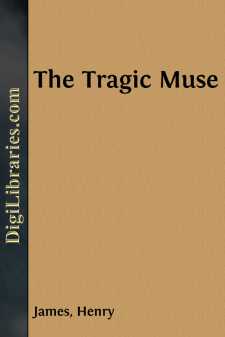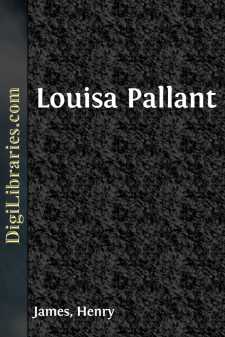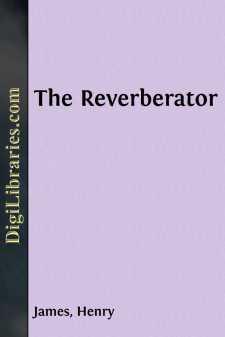Categories
- Antiques & Collectibles 13
- Architecture 36
- Art 48
- Bibles 22
- Biography & Autobiography 813
- Body, Mind & Spirit 142
- Business & Economics 28
- Children's Books 15
- Children's Fiction 12
- Computers 4
- Cooking 94
- Crafts & Hobbies 4
- Drama 346
- Education 46
- Family & Relationships 57
- Fiction 11828
- Games 19
- Gardening 17
- Health & Fitness 34
- History 1377
- House & Home 1
- Humor 147
- Juvenile Fiction 1873
- Juvenile Nonfiction 202
- Language Arts & Disciplines 88
- Law 16
- Literary Collections 686
- Literary Criticism 179
- Mathematics 13
- Medical 41
- Music 40
- Nature 179
- Non-Classifiable 1768
- Performing Arts 7
- Periodicals 1453
- Philosophy 64
- Photography 2
- Poetry 896
- Political Science 203
- Psychology 42
- Reference 154
- Religion 513
- Science 126
- Self-Help 84
- Social Science 81
- Sports & Recreation 34
- Study Aids 3
- Technology & Engineering 59
- Transportation 23
- Travel 463
- True Crime 29
Henry James
Henry James (1843-1916) was an American author known for his contributions to 19th-century literary realism and modernism. His works often explore themes of consciousness and perception, with notable novels including "The Portrait of a Lady," "The Turn of the Screw," and "The Wings of the Dove." James is celebrated for his intricate prose style and deep psychological insight into his characters.
Author's Books:
Sort by:
by:
Henry James
"Olive will come down in about ten minutes; she told me to tell you that. About ten; that is exactly like Olive. Neither five nor fifteen, and yet not ten exactly, but either nine or eleven. She didn't tell me to say she was glad to see you, because she doesn't know whether she is or not, and she wouldn't for the world expose herself to telling a fib. She is very honest, is Olive...
more...
by:
Henry James
A little more than an hour after this he stood in the parlour of Doctor Tarrant's suburban residence, in Monadnoc Place. He had induced a juvenile maid-servant, by an appeal somewhat impassioned, to let the ladies know that he was there; and she had returned, after a long absence, to say that Miss Tarrant would come down to him in a little while. He possessed himself, according to his wont, of the...
more...
by:
Henry James
CHAPTER I. EARLY YEARS. It will be necessary, for several reasons, to give this short sketch the form rather of a critical essay than of a biography. The data for a life of Nathaniel Hawthorne are the reverse of copious, and even if they were abundant they would serve but in a limited measure the purpose of the biographer. Hawthorne's career was probably as tranquil and uneventful a one as ever...
more...
by:
Henry James
The litigation seemed interminable and had in fact been complicated; but by the decision on the appeal the judgement of the divorce-court was confirmed as to the assignment of the child. The father, who, though bespattered from head to foot, had made good his case, was, in pursuance of this triumph, appointed to keep her: it was not so much that the mother's character had been more absolutely...
more...
by:
Henry James
I profess a certain vagueness of remembrance in respect to the origin and growth of The Tragic Muse, which appeared in the Atlantic Monthly again, beginning January 1889 and running on, inordinately, several months beyond its proper twelve. If it be ever of interest and profit to put one's finger on the productive germ of a work of art, and if in fact a lucid account of any such work involves that...
more...
by:
Henry James
IT was an occasion, I felt—the prospect of a large party—to look out at the station for others, possible friends and even possible enemies, who might be going. Such premonitions, it was true, bred fears when they failed to breed hopes, though it was to be added that there were sometimes, in the case, rather happy ambiguities. One was glowered at, in the compartment, by people who on the morrow,...
more...
by:
Henry James
Mrs. Gereth had said she would go with the rest to church, but suddenly it seemed to her that she should not be able to wait even till church-time for relief: breakfast, at Waterbath, was a punctual meal, and she had still nearly an hour on her hands. Knowing the church to be near, she prepared in her room for the little rural walk, and on her way down again, passing through corridors and observing...
more...
by:
Henry James
A LONDON LIFE I It was raining, apparently, but she didn't mind—she would put on stout shoes and walk over to Plash. She was restless and so fidgety that it was a pain; there were strange voices that frightened her—they threw out the ugliest intimations—in the empty rooms at home. She would see old Mrs. Berrington, whom she liked because she was so simple, and old Lady Davenant, who was...
more...
by:
Henry James
I Never say you know the last words about any human heart! I was once treated to a revelation which startled and touched me in the nature of a person with whom I had been acquainted—well, as I supposed—for years, whose character I had had good reasons, heaven knows, to appreciate and in regard to whom I flattered myself I had nothing more to learn. It was on the terrace of the Kursaal at Homburg,...
more...
by:
Henry James
I "I guess my daughter's in here," the old man said leading the way into the little salon de lecture. He was not of the most advanced age, but that is the way George Flack considered him, and indeed he looked older than he was. George Flack had found him sitting in the court of the hotel—he sat a great deal in the court of the hotel—and had gone up to him with characteristic directness...
more...











